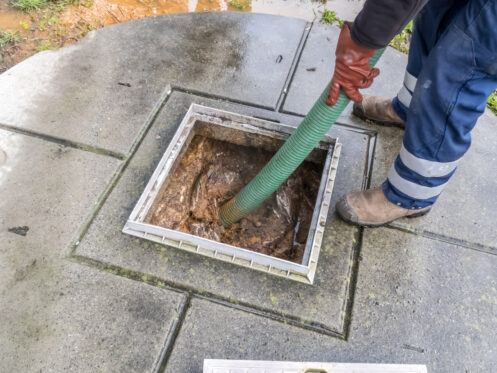To repair your septic system, you need a permit in many regions to guarantee compliance with health and environmental regulations. To find out what the guidelines are in your area, you can contact the health department or the building permit office. You’ll also find it helpful to contact a contractor who specializes in septic repairs. Obtaining any necessary permits is crucial to avoiding legal and regulatory trouble. Fortunately, there are several ways to avoid septic system repairs altogether. It starts with regular maintenance. Here are the top eight ways regular septic system maintenance helps eliminate costly and inconvenient repairs.
1. Pump Your Sewage System Regularly
Regular pumping of a sewage system is essential for preventing costly repairs. The accumulation of solid waste in the tank over time might lead to clogs and eventual system breakdowns. If you want your septic system to function properly and prevent a buildup of sludge, scheduling regular pumping is a must. You can extend the life of your system and keep expensive issues like backups and overflows at bay if you keep up with this preventive maintenance.
2. Inspect the Tank and Components
Professionals check the tank and other parts of the system during routine septic system maintenance to catch problems before they worsen. This preventative method guarantees the replacement of any broken, worn, or malfunctioning components. Homeowners can save money on repairs by catching these issues early and fixing them before they get worse. As an added bonus, septic system inspections keep homeowners stress-free by reducing the likelihood of breakdowns. Regular maintenance also increases the system’s overall efficiency and dependability.
3. Manage the Drain Field Efficiently
Efficient management of the drain field is a top priority for septic system professionals during maintenance. Soil compaction and structural problems that can obstruct drainage are among the things they look for. Experts save on expensive repairs caused by backups and soil saturation by making sure the drain field works properly. This preventative measure keeps the system from becoming unbalanced or breaking down too soon, reducing the likelihood of catastrophic failure.

4. Avoid Harsh Chemicals
If you want to keep the beneficial bacteria in your septic tank in check and avoid using harsh chemicals, regular maintenance is a must. To avoid chemical harm to the system, experts advise homeowners on septic-safe procedures. Maintenance guarantees a healthy microbiological ecosystem by encouraging correct waste disposal and teaching about septic-friendly items. This proactive measure protects the septic system from potentially damaging contaminants. It also reduces the likelihood of damage and the expense of necessary repairs.
5. Add Septic System Biostimulants
Professionals may, as part of routine maintenance, add additives to septic systems to boost bacterial activity. They do this in an attempt to speed up the decomposition of waste. Some examples of such additions include biostimulants, bacterial cultures, and enzymes. They all work to improve the tank’s microbiome. These additives lessen the likelihood of malfunctions and expensive repairs by facilitating effective waste breakdown. This, in turn, prevents sludge accumulation and system blockages. Proper additives, when used regularly, help the septic system stay healthy and last longer.
6. Address Leaks Promptly
Fixing plumbing leaks quickly is an important part of routine septic system maintenance. Quickly repairing leaks stops water from entering the system. This lessens the load on components and protects them from any harm. Maintaining the septic system in this proactive manner is essential for preventing costly repairs. It also extends the lifespan of the septic tank and drain field.
7. Upgrade Outdated Systems
Homeowners can easily upgrade old components with the help of regular septic system maintenance. Experts will spot worn or inefficient parts, enabling them to update them before they decrease the performance of the septic system. This is vital to reducing the likelihood of malfunctions and costly repairs.
8. Schedule Regular Maintenance
If you want your septic system to be ready for anything, at any time, anywhere, regular maintenance is a must. By checking the system’s preparedness, experts help homeowners be ready for situations like floods or power outages. There are several ways that homeowners can avoid emergencies. One way is to reduce water usage during power outages and situations involving flooding. This prevents overwhelming the septic system.
Why is regular maintenance important for my septic system?
Regular maintenance helps ensure that your septic system functions properly, extends its lifespan, and reduces the likelihood of costly repairs. It also helps protect the environment and maintain compliance with regulations.
What should I do if I experience a septic system emergency?
In the event of a septic system emergency, such as a backup or overflow, contact Salina Septic Service immediately for prompt assistance.
Salina Septic Service is here to meet all of your septic system needs in Salina, KS. We also specialize in portable restrooms, roll-off dumpster rentals, and more. To arrange for professional septic system maintenance, contact us immediately.





